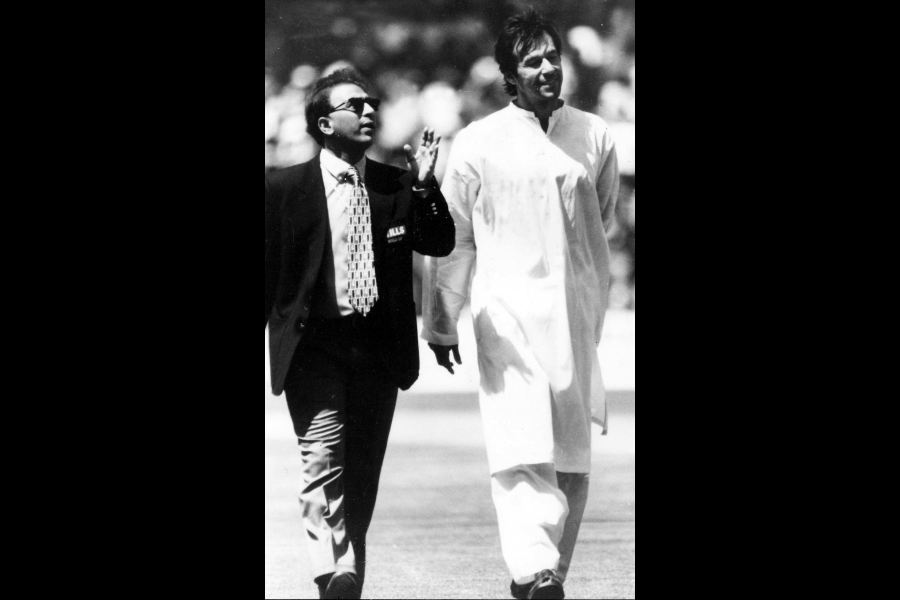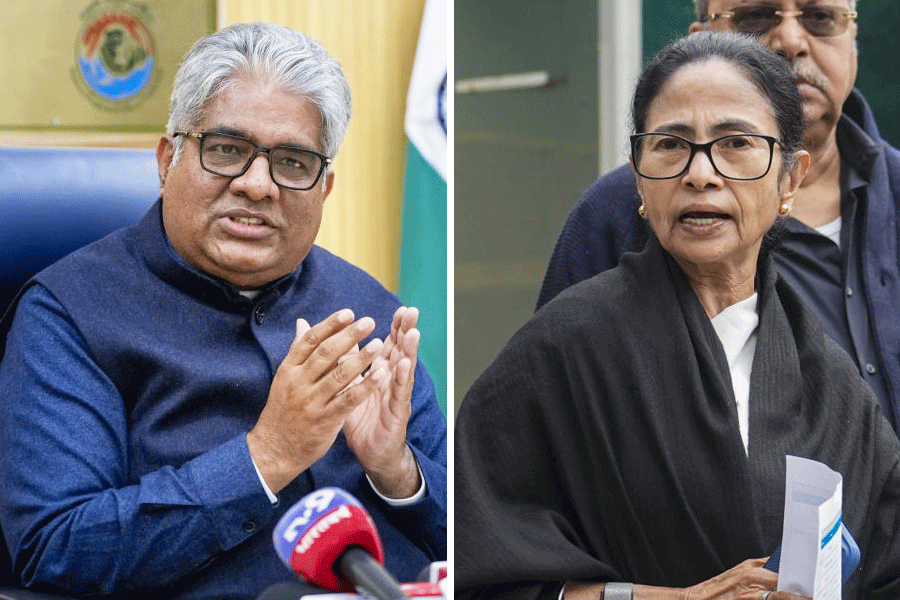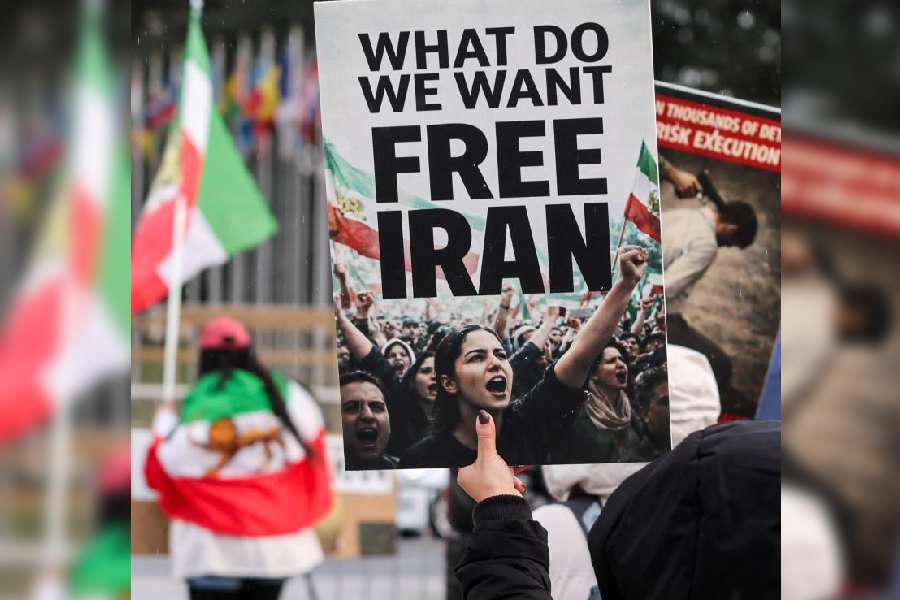|
|
| Starting the debate |
The view in Washington of L.K. Advani?s visit to Pakistan and its subsequent fallout on the Indian polity is very different from what it is in New Delhi. The assessment in Washington holds good for Europe, south-east Asia and the Gulf, in countries like Germany, Singapore and Oman, which consciously decided in the Nineties to opt for a big stake in India in their external affairs.
In the cacophony over the Rashtriya Swayamsevak Sangh?s criticism of Advani, his resignation and the Bharatiya Janata Party resolution, which paved the way for Advani?s return as the party?s president, what is ignored is that his visit to Pakistan was not an event in isolation. It was part of a process within the foreign-policy apparatus of the leading opposition party. Around the same time that Advani was in Pakistan, the former external affairs minister, Jaswant Singh, was on a tour of three countries ? Britain, the United States of America and Israel. All three are countries whose policy orientation towards India was altered to a very large extent because of Singh?s diplomacy after the 1998 nuclear tests and the Kargil war. In addition to these two BJP stalwarts, the former disinvestment minister, Arun Shourie, was in the US, addressing one of the most prestigious and influential overseas Indian conclaves that there is: IIT 2005, the Global IIT Alumni Conference.
Much has been made of Singh?s support for Advani during the Jinnah episode and the outspoken criticism of the former external affairs minister, Yashwant Sinha, of the BJP president. No one need be surprised by this. Jaswant Singh was treated as a shadow foreign minister when he was in the US. His speeches at the Brookings Institution in Washington and at a meeting jointly organized in New York by the Council for Foreign Relations, the Asia Society and Citibank as part of their series on ?Asian Distinguished Leaders?, his presence as chief guest at an India-Israel partnership conference organized by Tel Aviv University, and some similar events planned in London shortly mark Singh?s return to the party?s centre-stage as its man for foreign policy. He had given up this role after he became finance minister in the National Democratic Alliance government. The BJP?s experiment with Yashwant Sinha as its man for external affairs has been junked after Sinha failed to exploit the United Progressive Alliance government?s altogether obvious shortcomings in foreign policy and make the most of it for the opposition in the last one year. Besides, Jaswant Singh has never been afraid to express his views openly even when they are not popular either within his party or among conservative vote-banks.
In the major capitals of the world, those who deal with south Asia look upon Advani?s trip to Pakistan as the only significant thing to have happened in India-Pakistan relations since Atal Bihari Vajpayee?s historic 1999 visit to Minar-e-Pakistan, the memorial in Lahore at the spot where the Muslim League, on March 23, 1940, passed the resolution calling for the creation of the independent Muslim state to be carved out of India. They know that everything else, including Vajpayee?s subsequent visit to Islamabad in January 2004 and Manmohan Singh?s meeting with General Pervez Musharraf in New York last September, is mostly hype, perhaps transitory and definitely reversible, even though the demands of diplomacy require that all that should be welcomed and extolled.
In these capitals, there is also an awareness that the next elections to the Lok Sabha are not going to be fought on the issue of what Advani wrote about the Father of Pakistan when he visited Jinnah?s mausoleum, just as George W. Bush ? or even Tony Blair, for that matter ? was re-elected despite the war and the occupation of Iraq. But those who deal with south Asia in these capitals do know that Advani?s visit to Pakistan will be remembered in that country for a very, very long time and that it will have an impact on Indo-Pakistan relations even if the BJP remains out of power.
There are many examples in the history of international relations of initiatives such as Advani?s. It is reminiscent of the visit of the West German chancellor, Willy Brandt, to the former East three-and-a-half decades ago, which historians consider to be a milestone during the Cold War. More recently, Advani?s trip has shades of the journey of the Kuomintang leader, Lien Chan, to mainland China, the first meeting between top leaders of nationalists and communists since Chiang Kai-shek lost the war to Mao Zedong in 1949. For those abroad, who follow India-Pakistan d?tente closely, and for those in the chanceries in Chanakyapuri and in Islamabad?s Diplomatic Enclave who are familiar with the preparations that went into Advani?s visit in both capitals, the rumpus within the BJP has done little to diminish its importance. For many of them, it would seem that Advani is setting the agenda for India-Pakistan rapprochement on a scale much larger than what a leader of the opposition is normally capable of. Witness, for instance, his proposal for a debate on Jinnah: in reality a debate has already begun in India. To a limited extent, Advani has reminded Pakistanis too of what Jinnah is really all about at a time when Pakistan is at the crossroads in a renewed search for its identity.
A lot of the nuancing that Advani engaged in throughout his travels across the border has been lost in the single-minded focus on his remarks about Jinnah, both in the media and within the saffron flock. What will not be lost on the diplomatic community and foreign governments, however, is that Advani repeatedly spoke of ?my government? when he talked of the Indian government: he was not talking of the NDA government, but the government of India.
As a reporter who covered Vajpayee?s bus journey to Lahore in 1999, this writer remembers the electrifying and emotional impact that he made on Pakistanis when he said in his speech on the lawns of the Punjab governor?s mansion ?that history can be changed ? not geography. We are neighbours and should learn to co-exist in peace and gain prosperity.? Whatever Advani said and did in Pakistan was a tortuous, but logical extension of Vajpayee?s speech and his visit to Minar-e-Pakistan, which was opposed even by some of the then prime minister?s closest aides.
There is more to the controversy that Advani has generated in the wake of his journey across the border than any ideological schism between the RSS and the BJP. To see the fallout of his remarks about Jinnah only in the context of this schism is to look at the whole issue with the kind of blinkers that are unfortunately all too common in India in analysing the BJP?s equation with the RSS.
Indira Gandhi and Rajiv Gandhi both attempted to begin a process by which India would come to terms with Partition and the creation of Pakistan, not only in state-to-state relations with its neighbour, but psychologically and emotionally as a nation that was torn apart by the division which brought independence. They did not go far because the time for such a historic change had not yet come.
Vajpayee launched that process, to which the Manmohan Singh government is firmly committed. But the process of coming to terms with Pakistan will fall short, even when it is finally successful, unless Indians can also accept Jinnah the same way that they accept the reality of Pakistan. It will not be easy, especially in states like Punjab or Jammu and Kashmir. It is a process that Pakistanis are going through as well: they have come to terms with the creation of Bangladesh, but it will be a very long while before they similarly come to terms with Mujibur Rahman or what led to the demise of East Pakistan.
What Advani has done is to initiate this historic process in India of coming to terms with the creator of Pakistan, without which the process of living with Pakistan in peace as a neighbour will forever remain incomplete. It will not be easy, as this month?s events have shown. It is not an issue that is limited to the BJP or the RSS, but concerns all Indians. But in the final analysis, the RSS will have no choice, but to grudgingly, even if slowly, go along with what Advani has initiated.











